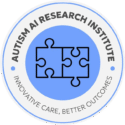
RESEARCH AREAS
AI is also being used in autism research to better understand the condition and develop new treatments.
- Genetic Research: AI can help researchers analyze genetic data to identify potential genetic markers or variations that contribute to autism. This could lead to better-targeted therapies and personalized medical interventions in the future.
- AI to augment Chemical Research in Autism:
Neurotransmitter Imbalances
- Autistic individuals often show differences in brain chemistry, particularly in neurotransmitters:
- Serotonin: Elevated blood serotonin levels have been observed in some people with autism.
- GABA and Glutamate: Imbalances in these inhibitory and excitatory neurotransmitters may affect sensory processing and behavior.
- Dopamine: Plays a role in reward processing and motivation, areas often affected in ASD.
Oxidative Stress and Antioxidants
Some studies suggest individuals with autism have higher oxidative stress and lower antioxidant levels, which may affect brain development. Glutathione, a key antioxidant, is often found in lower levels in individuals with ASD.
- Inflammation and Immune Function
Research shows signs of chronic brain and systemic inflammation in some autistic individuals. Cytokines (chemical messengers of the immune system) may be elevated, indicating immune dysregulation.
1.2.4 Environmental Toxins
Studies have explored the role of exposure to heavy metals (like mercury or lead), pesticides, and air pollutants during pregnancy or early childhood and their potential links to autism.
- Gut-Brain Axis & Microbiome
The gut microbiome produces various chemicals that influence the brain (e.g., short-chain fatty acids like butyrate). Dysbiosis (imbalanced gut flora) and altered production of neuroactive compounds may contribute to symptoms.
- Hormonal Factors
Hormones like testosterone, estrogen, and oxytocin have been studied for their roles in social behavior and brain development. Oxytocin is being explored as a treatment for improving social skills in autism.
Pharmacological Interventions
Drugs targeting chemical pathways are being tested for symptom management:
- Risperidone and aripiprazole (affect dopamine/serotonin)
- Bumetanide (influences GABA function)
- Nutraceuticals like melatonin, folinic acid, or omega-3s
